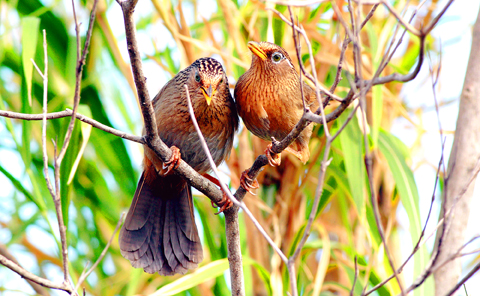Bird watchers yesterday warned the indigenous Taiwan Hwamei (Leucodioptron taewanum) may face extinction if the threat of cross-breeding with the Chinese variety is not controlled soon.
“Because of the reckless abandonment of pet Chinese Hwamei’s into the wild, the wild Taiwan Hwamei population is currently being impacted greatly,” Lin Hui-shan (林惠珊) of the Chinese Wild Bird Federation told the Taipei Times yesterday.
The Hwamei is mostly brown with a scattering of black feathers on its head, back and breast, and measures about 24cm long.

PHOTO: CNA
The Taiwan Hwamei was once thought to be a sub-species of the Chinese Hwamei, but in 2006 the Council of Agriculture’s (COA) Endemic Species Research Institute, via a gene analysis, found that the Taiwanese birds are endemic to the island as they are at least 3.5 percent genetically different from their Chinese counterparts, meaning that the two have evolved independently for about 1.5 million years.
The Chinese Hwamei derives its name from its most distinctive character — a white ring around its eyes. Hwamei means “drawn eyebrows (畫眉)” in Mandarin.
Lin added that Chinese Hwamei have traditionally been imported as pets because of their pleasant vocalizations. Though the COA banned the sale of Hwameis in 2002, crossbreeds of the Taiwanese and Chinese birds are being increasingly spotted in the wild, she said.
“The Taiwan Hwamei is unique to Taiwan. If the crossbreeding continues, not only will we one day cease to see Taiwan Hwamei’s, the world may lose this species from its ecosystem,” she said.
Lin called on people who own imported birds as pets to refrain from releasing them into the wild and take measures to prevent them from escaping.

Nipah virus infection is to be officially listed as a category 5 notifiable infectious disease in Taiwan in March, while clinical treatment guidelines are being formulated, the Centers for Disease Control (CDC) said yesterday. With Nipah infections being reported in other countries and considering its relatively high fatality rate, the centers on Jan. 16 announced that it would be listed as a notifiable infectious disease to bolster the nation’s systematic early warning system and increase public awareness, the CDC said. Bangladesh reported four fatal cases last year in separate districts, with three linked to raw date palm sap consumption, CDC Epidemic Intelligence

Two Taiwanese prosecutors were questioned by Chinese security personnel at their hotel during a trip to China’s Henan Province this month, the Mainland Affairs Council (MAC) said yesterday. The officers had personal information on the prosecutors, including “when they were assigned to their posts, their work locations and job titles,” MAC Deputy Minister and spokesman Liang Wen-chieh (梁文傑) said. On top of asking about their agencies and positions, the officers also questioned the prosecutors about the Cross-Strait Joint Crime-Fighting and Judicial Mutual Assistance Agreement, a pact that serves as the framework for Taiwan-China cooperation on combating crime and providing judicial assistance, Liang

The manufacture of the remaining 28 M1A2T Abrams tanks Taiwan purchased from the US has recently been completed, and they are expected to be delivered within the next one to two months, a source said yesterday. The Ministry of National Defense is arranging cargo ships to transport the tanks to Taiwan as soon as possible, said the source, who is familiar with the matter. The estimated arrival time ranges from late this month to early next month, the source said. The 28 Abrams tanks make up the third and final batch of a total of 108 tanks, valued at about NT$40.5 billion

Reports of Taiwanese going missing, being detained or interrogated, or having their personal liberties restricted in China increased about fourfold annually last year, the Mainland Affairs Council (MAC) said yesterday. Last year, 221 Taiwanese who traveled to China were reported missing, were detained and interrogated, or otherwise had their personal freedom restricted, up from 55 the previous year, the council said. Reopening group tours to China would be risky, as it would leave travelers with no way to seek help through official channels after Beijing shut down dialogue between the associations tasked with handling cross-strait tourism, the MAC said. Taipei’s Taiwan Strait Tourism